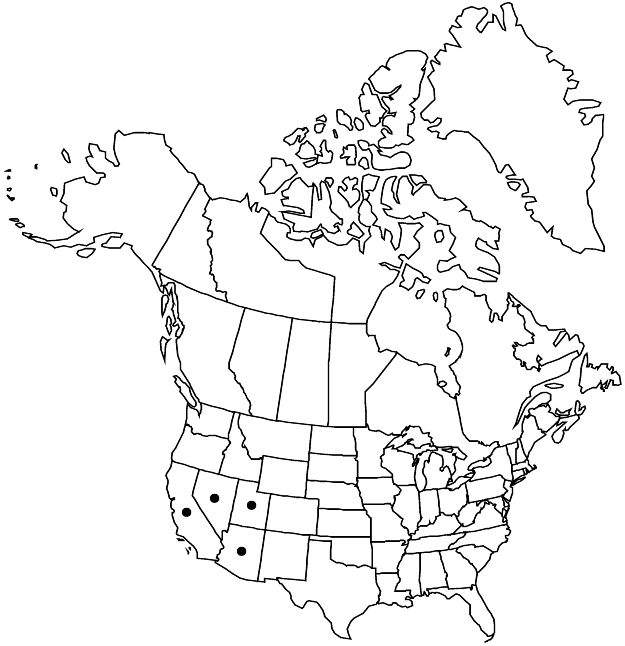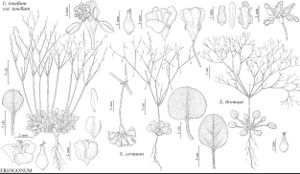Difference between revisions of "Eriogonum thomasii"
in War Department [U.S.], Pacif. Railr. Rep. 5(2): 364. 1857.
FNA>Volume Importer |
imported>Volume Importer |
||
| (2 intermediate revisions by one other user not shown) | |||
| Line 1: | Line 1: | ||
{{Treatment/ID | {{Treatment/ID | ||
|accepted_name=Eriogonum thomasii | |accepted_name=Eriogonum thomasii | ||
| − | |accepted_authority=Torrey | + | |accepted_authority=Torrey |
|publications={{Treatment/Publication | |publications={{Treatment/Publication | ||
|title=in War Department [U.S.], Pacif. Railr. Rep. | |title=in War Department [U.S.], Pacif. Railr. Rep. | ||
| Line 8: | Line 8: | ||
}} | }} | ||
|common_names=Thomas’s wild buckwheat | |common_names=Thomas’s wild buckwheat | ||
| + | |special_status={{Treatment/ID/Special_status | ||
| + | |code=F | ||
| + | |label=Illustrated | ||
| + | }} | ||
|basionyms= | |basionyms= | ||
|synonyms= | |synonyms= | ||
| Line 33: | Line 37: | ||
-->{{#Taxon: | -->{{#Taxon: | ||
name=Eriogonum thomasii | name=Eriogonum thomasii | ||
| − | + | |authority=Torrey | |
| − | |authority=Torrey | ||
|rank=species | |rank=species | ||
|parent rank=subgenus | |parent rank=subgenus | ||
| Line 47: | Line 50: | ||
|publication title=in War Department [U.S.], Pacif. Railr. Rep. | |publication title=in War Department [U.S.], Pacif. Railr. Rep. | ||
|publication year=1857 | |publication year=1857 | ||
| − | |special status= | + | |special status=Illustrated |
| − | |source xml=https:// | + | |source xml=https://bitbucket.org/aafc-mbb/fna-data-curation/src/2e0870ddd59836b60bcf96646a41e87ea5a5943a/coarse_grained_fna_xml/V5/V5_835.xml |
|subfamily=Polygonaceae subfam. Eriogonoideae | |subfamily=Polygonaceae subfam. Eriogonoideae | ||
|genus=Eriogonum | |genus=Eriogonum | ||
Latest revision as of 22:14, 5 November 2020
Herbs, spreading, annual, 0.5–3 dm, glabrous, greenish, sometimes grayish or reddish. Stems: caudex absent; aerial flowering stems erect, solid, not fistulose, 0.2–1 dm, glabrous except for few glands proximally. Leaves basal; petiole 0.5–3 cm; blade round to round-reniform, 0.5–2 × 0.5–2 cm, densely white-tomentose abaxially, floccose to glabrate and greenish adaxially, margins plane. Inflorescences cymose, open to diffuse, 5–25 × 5–25 cm; branches glabrous; bracts 3, scalelike, 1–2.5 × 1–2 mm. Peduncles capillary, spreading to slightly recurved, straight or curved, capillary, 0.5–3 cm, glabrous. Involucres turbinate-campanulate, 0.6–1.2 × 0.7–1.3 mm, glabrous; teeth 5, erect, 0.4–0.6 mm. Flowers 0.8–1 mm in early anthesis, becoming 1.2–2 mm; perianth yellow in early anthesis, becoming white to rose, short-hispidulous; tepals dimorphic, those of outer whorl cordate, becoming saccate-dilated proximally, those of inner whorl spatulate; stamens included, 0.5–0.9 mm; filaments mostly glabrous. Achenes brown to dark brown, usually lenticular, 0.8–1 mm, glabrous. 2n = 40.
Phenology: Flowering year-round.
Habitat: Sandy flats, washes, and slopes, saltbush, greasewood, creosote bush, and sagebrush communities, pinyon and/or juniper woodlands
Elevation: -70-1200(-1400) m
Distribution

Ariz., Calif., Nev., Utah, Mexico (Baja California, Sonora).
Discussion
Eriogonum thomasii is common to abundant and even weedy throughout its range on the Mojave and Sonoran deserts in Arizona, southeastern California, southern Nevada, and southwestern Utah. The distinctive swollen bases of the outer tepals are easy to observe in fruiting material but not always obvious in early anthesis.
Selected References
None.
